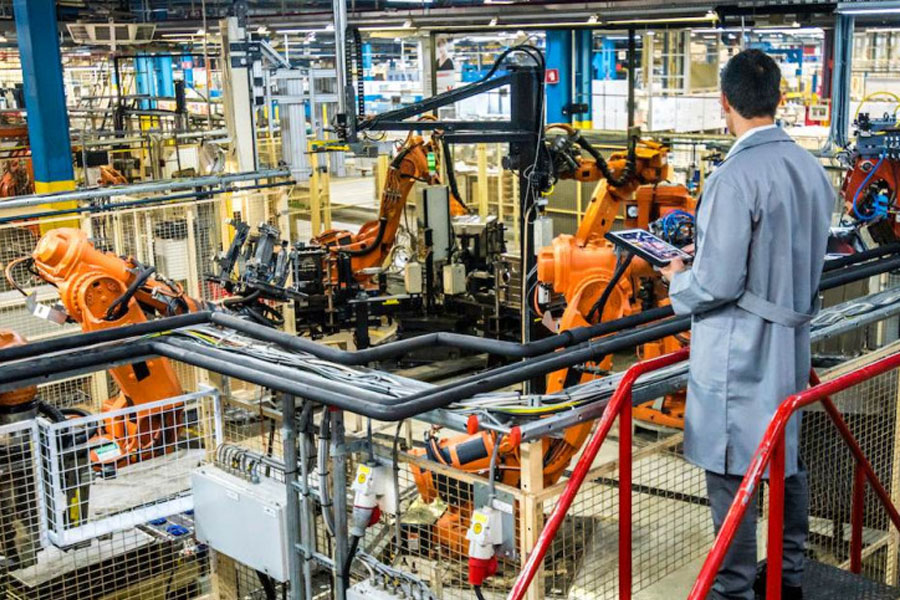Industrial Engineering
| Department of Industrial Engineering - Systems Optimization (MSc) |  |
 |
| Department of Computer Engineering |
A Master of Science in Industrial Engineering is an educational and research program focused on advanced teachings in industrial engineering and systems analysis. Its aim is to train specialists who can utilize engineering knowledge and the specialized courses offered within this program to understand, analyze, and propose designs for systems composed of human, material, and machine components.
Graduates of this program will possess the following skills:
- Identifying and investigating issues within ministries, headquarters organizations, and industrial systems.
- Establishing meaningful connections between various types of production and non-production systems.
- Planning and presenting models to optimize the performance of systems.
- Controlling systems to monitor deficiencies and providing desirable and final models.
- Participating in the planning and execution of industrial research projects.
- Offering appropriate templates for designing large-scale production units in the country.
 |
Department of Industrial Engineering - Logistics and Supply Chain (MSc) |
 |
| Department of Communication |
A Master's program in Industrial Engineering with a specialization in Logistics and Supply Chain is an educational course that emphasizes advanced teachings in industrial engineering. Its goal is to educate experts who, leveraging their engineering knowledge and the specialized courses offered in this program, are capable of understanding, analyzing, and proposing designs for systems consisting of collaborating organizations within the supply chain.
This program is designed for a duration of two academic years (4 semesters). Typically, the first two semesters are dedicated to coursework, while the final two semesters involve seminars and research thesis work.
With the rapid advancement of science and technology and the increasing complexity therein, production and service systems have also expanded. Proper management of such units requires the application of advanced scientific techniques for prediction, modeling, planning, procurement, execution, monitoring, and evaluation of outcomes aligned with organizational goals. The supply chain comprises a set of members, including suppliers, producers, distributors, retailers, and end customers, aiming to streamline operations to reduce system costs and enhance customer service levels.
Furthermore, in the national scientific roadmap, the priority areas for science and technology in the country, as outlined in section 3-2, emphasize the importance and priority of establishing the field of "Logistics and Supply Chain." For example, under priority (a), which pertains to national priorities in the third chapter, the subcategory of information and communication technology (ICT) is mentioned, which is relevant to Electronic Supply Chain Management (ESCM). Additionally, in the subcategory of fundamental and applied sciences, attention is given to the subgroup of energy recovery and conversion, which relates to green supply chains and reverse supply chains. The issue of non-military defense is also highlighted in the technology subcategory under priority (b), which is relevant to logistics in crisis situations, an important topic in the field of logistics and supply chain management.
|
Department of Industrial Engineering - Health Systems (MSc) |
 |
 |
| Department of Electric Power Engineering |
A Master's degree program in Industrial Engineering with a specialization in Healthcare Systems Engineering is an advanced educational program that emphasizes advanced education in industrial engineering. Its goal is to train specialists who, through the knowledge and engineering expertise gained from this program's specialized courses, are capable of understanding, analyzing, and presenting the best approaches and solutions to address systemic issues in the field of healthcare and treatment.
This program is designed for two academic years (4 semesters). Typically, during the first two semesters, students complete instructional courses, and during the last two semesters, they work on seminars and research theses.
With the rapid advancement of science and technology and the increasing complexity thereof, service systems, including the healthcare and treatment sector, have expanded. Proper management of these units necessitates the application of advanced scientific techniques for planning, simulation, troubleshooting, implementation, monitoring, and evaluation of results in line with organizational objectives. Healthcare Systems Engineering takes a systemic approach to addressing the challenges within healthcare and treatment systems, aiming to resolve these issues using the best practices and approaches based on the principles of industrial engineering.
Furthermore, in the country's comprehensive scientific roadmap, the priorities of science and technology in the third chapter, section 3-2, emphasize the importance and priority of launching the field of "Healthcare Systems Engineering." For example, in priority (a), the country's priorities in science and technology refer to the subgroup of health policy and health economics related to healthcare economics. Additionally, under priority (b), in the healthcare subgroup, there is a focus on information management and healthcare knowledge, which is related to information technology in healthcare, healthcare information systems, and clinical and executive data mining. In priority (c), within the healthcare subgroup, the country's comprehensive scientific roadmap addresses interdisciplinary research between basic sciences and clinical sciences, which relates to operational research for the healthcare sector and probabilistic models in healthcare.
 |
Department of Industrial Engineering (BSc) |
 |
| Department of Control |
Industrial engineering is the only engineering discipline where human factors constitute one of its fundamental components within the systems it studies. Engineers in this field are deployed in interdisciplinary teams to handle tasks related to planning, installation, control, and improvement of institutional activities. These activities may encompass production actions, product innovation, service delivery, transportation, and organizational information flow. These engineers establish the necessary foundation for cross-specialty interaction and teamwork, thereby ensuring a more coherent approach to the design, planning, execution, and monitoring of production and service systems. Ultimately, this achievement leads to continuous improvements in work efficiency, employee comfort, cost reduction, quality enhancement, and customer satisfaction. Similar to other undergraduate programs in technical and engineering fields, this course is typically offered and completed over an average of four years or eight semesters.